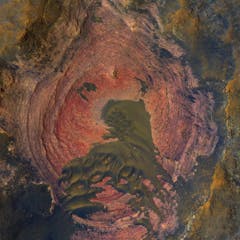
Articles on Mars
Displaying 101 - 120 of 279 articles

An update of 50-year-old regulations has kickstarted research into the next generation of rockets. Powered by nuclear fission, these new systems could be the key to faster, safer exploration of space.

US and international law conflicts about who would be in charge if a private company established a Moon base or colonized Mars.

Understanding isolation’s effects on regular people, rather than those certified to have ‘the right stuff,’ will help prepare us for the future, whether another pandemic or interplanetary space travel.

Delay has turned space mission ExoMars2020 into ExoMars2022.

NASA’s InSight lander has recorded the first evidence of earthquake-like tremors on Mars. The discovery opens a new chapter in our understanding of the geological processes at play on another world.

The InSights mission is producing the first evidence-based picture of Mars’s interior.

Sex technologies and ‘erobots’ could help address issues related to human desire, and physical and emotional needs of astronauts in space.

In preparation for possible future missions to Mars, scientists figure out how to quickly and efficiently measure brain performance and mental fatigue.

An expert explains the challenges of a mission to Mars for younger readers.

From alien life to human spaceflight, 2020 may deliver some exciting news.

Many people are still upset that Pluto was demoted from being a planet. But definitions of various celestial objects are fairly fluid. So whether it is an asteroid or moon or planet is up for debate.

Collecting samples from Mars and brining them back to Earth will be a hugely complicated task, but it may be our best bet of finding alien life.

New research on landslides on Mars could help protect against devastating landslides on Earth.

NASA has released a sound recording from Mars. So what do these literally otherworldly sounds tell us about the processes at play inside the red planet?

Musk’s plans have potentially dire consequences for alien life, astronauts and the environment.

The first Martian might just be a human being.

Our own planet shows that environmental modification is possible on a planetary scale in quite a short span of time.

From solar sail-powered spacecraft, to laser communications, to asteroid detection systems, there is no shortage of Australian ideas and expertise to help NASA explore the Moon and Mars.

It’s established Mars was once a planet with surface-level water. So with multiple MARS missions starting next year, the key to seeking out martian life may instead lie in the contents of its ‘dust’.

This hot, acidic neighbor with its surface veiled in thick clouds hasn’t benefited from the attention showered on Mars and the Moon. But Venus may offer insights into the fate of the Earth.
